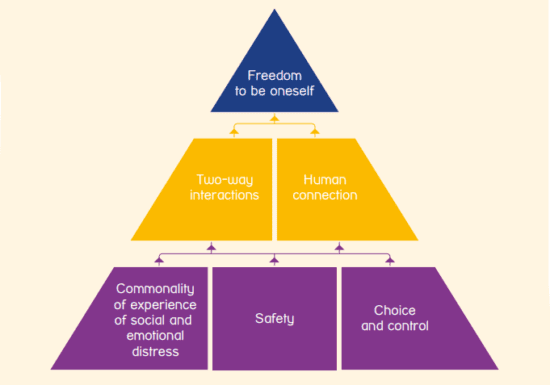Andreja Mesaric
Women Side by Side is a programme of women-led peer support, for women who are experiencing, or are at risk of developing, poor mental health.
Across the projects, peer support will look different in different contexts but essentially it is about “the relationships that people build, as they share their own experiences to help and support each other”.
The programme’s main focus is on women experiencing multiple disadvantage – for example, those experiencing mental health problems, homelessness, drug and alcohol misuse, abuse and violence, family breakdown, offending or a combination of these.
It is run by the mental health charity, Mind, and Agenda, the Alliance for Women and Girls at Risk. The programme has funded 68 grassroots projects across England and Wales.
As part of this, five regional hubs have also been funded to support the projects. These bring together organisations from the women’s, mental health and community sectors, to share expertise and learning on how best to support women in a gender-responsive and trauma-informed way.
Building on what we know
Women Side by Side builds on findings from the Side by Side and Mapping the Maze projects that Mind and McPin, and Agenda were involved in, respectively.
Side by Side looked at the impact and values of community-based peer support for mental health. Mapping the Maze explored the provision of support services for women experiencing multiple disadvantage in England and Wales, and identified what good practice looked liked.
The work revealed that there is a severe lack of consistent, well-resourced and joined-up services for women that are gender-responsive and trauma-informed. These elements were found to be crucial for effective support.
Drayton Park Women’s Crisis House and Resource Centre was one of the services highlighted by Mapping the Maze and is a good example of a service that embodies these principles.
It is “designed and run exclusively for women” and the approach employed by staff considers “the woman and her wider life experiences, in particular trauma and abuse, rather than her diagnosis”.
By using both gender-responsive and trauma-informed approaches, and bringing together different sectors that often work independently, Women Side by Side aims to better address the needs of women, particularly those who are affected by a range of issues simultaneously.
In addition, because equality is a core value of peer support, this type of relationship can be empowering for women who have experienced multiple disadvantage in their lives. This is strengthened further by the programme’s aim to develop women in leadership positions within individual projects.
Lived experience expertise
The McPin Foundation is conducting research to evaluate the Women Side by Side programme. Central to our work is the expertise of women with relevant lived experience.
We have set up a women-only team of peer researchers, covering five regions in England and Wales, and are also involving Lived Experience Advisory Panels at different stages of the process.
Our evaluation work focuses on three main areas:
- Impact of peer support – We are measuring the impact of peer support on the mental health and wellbeing of women participating in the funded projects.
- Peer support values – We are exploring what values underpin gender-responsive, trauma-informed peer support. This will include looking at how these values compare to the peer support values framework (Figure. 1) that we developed in the evaluation of the Side by Side programme.

Figure 1. Peer support values framework.
- Partnership working – We are exploring how effectively the Women Side by Side programme brings together the women’s, mental health and community sectors and how this approach benefits the work of individual projects, as well as the programme as a whole.
Peer support has a long history in mental health. However, the circumstances of people’s lives extend beyond mental health and so, the peer support context has a significant impact on who is considered a peer.
With this in mind, our research will hopefully provide further insights into what shapes and defines ‘peerness’ in different contexts.
Learning from observation
Our evaluation will also give us a better understanding of what contributes to effective gender-responsive, trauma-informed peer support. Using observational methodology, which includes visiting, observing and participating in peer support sessions, partnership and advisory group meetings, and regional learning events, is particularly helpful here.
This is because it will allow us to learn from peer support situations as they unfold. For example, by mapping group dynamics, we will be able to explore what factors contribute to or hinder the development of effective peer relationships.
This learning will also benefit other aspects of our work, for example, by improving the relevance of subsequent interview questions with peer support participants.
As well as analysis at the project level, we will also be conducting research at an infrastructure level. Doing so will enable us to learn how strategic decisions are made and what factors underpin effective partnership working and shared learning. This will be pivotal in understanding and overcoming the issues that perpetuate siloed working.
Finally, an important aspect of this work is that the evaluation is carried out in parallel with the delivery of the peer support programme itself. This will improve the quality and sustainability of the programme and it will provide much needed insights into areas that are still poorly understood. This learning can then inform the design and delivery of future programmes.
Looking ahead
The funded projects are currently halfway into their one-year delivery of the programme. So far, the regional researchers have established good relationships with several projects and have already been gaining useful insights.
We are very much looking forward to what this work will reveal and to supporting projects to share their story of peer support in their own words.
